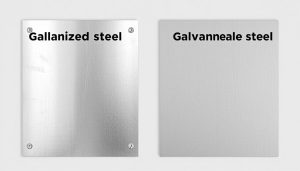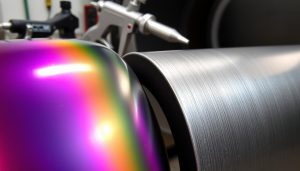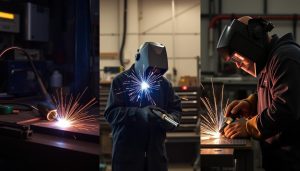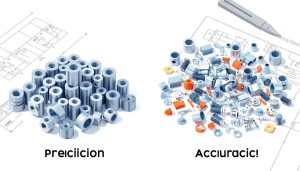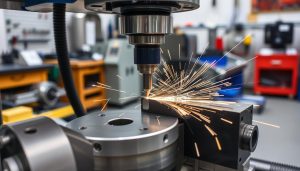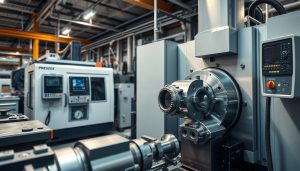In today’s fast-paced manufacturing world, choosing between 4-axis and 5-axis CNC machining is key. These advanced technologies help industries achieve higher precision and efficiency. Knowing the differences between 4-axis and 5-axis CNC machining is crucial for making smart choices.
This article will help you understand the details of these CNC machining methods. It’s designed to give you the knowledge you need to make the right choice for your needs. Whether you’re experienced or new to CNC machining, this guide will offer valuable insights to improve your operations and open up new possibilities in precision engineering.
What Is 4-Axis CNC Machining?
4-axis CNC machining is a cutting-edge method that goes beyond traditional 3-axis machining. It adds a fourth axis for more complex tasks. This allows for the creation of detailed, precise parts and components.
Key Features of 4-Axis Machines
What sets 4-axis CNC machines apart is the extra rotary axis. This fourth axis lets the workpiece rotate around a fixed point. It makes it easier to machine multiple sides without needing to re-fix the part manually. This opens up new possibilities for complex tasks.
When to Choose 4-Axis CNC Machining
4-axis CNC machining is perfect for many manufacturing needs. It’s especially useful for parts with intricate, multi-sided features. Here are some scenarios where it shines:
- Production of complex, asymmetrical parts
- Machining of parts with undercuts or hard-to-reach areas
- Manufacture of components with unique or specialized shapes
- High-precision, multi-sided machining tasks
With the extra rotary axis, 4-axis CNC machines boost manufacturing efficiency. They make production more cost-effective and precise. This is great for a wide range of parts and components.
What Is 5-Axis CNC Machining?
5-axis CNC machining is a cutting-edge method in manufacturing. It goes beyond the usual 3-axis or 4-axis CNC machines. 5-axis systems have two more rotational axes. This lets them machine parts from multiple angles at once.
Key Features of 5-Axis Machines
5-axis CNC machines have five axes of motion. The usual three linear axes (X, Y, and Z) are joined by two rotational axes (A and B or A and C). This extra movement lets the tool reach parts from almost any angle. It opens up a wide range of possible shapes and designs for parts.
The Added Benefits of 5-Axis CNC
The advanced features of 5-axis CNC machining bring many benefits:
- Improved Precision: The extra rotational axes make for more precise and detailed part machining. This is especially true for complex shapes.
- Reduced Setup Time: 5-axis machines can finish parts in one setup. This cuts down on the need for part re-orientation and shortens production time.
- Ability to Create Complex Shapes: The five-axis system allows for parts with complex geometries. This includes 5-axis CNC parts that would be hard or impossible to make with traditional 3-axis or 4-axis machining.
These benefits make 5-axis CNC machining a valuable tool for manufacturers. It helps them create more complex parts and work more efficiently.
4-Axis vs 5-Axis CNC: Key Differences
Choosing between 4-axis and 5-axis CNC machining affects your final product a lot. Each system has different machining capabilities and precision. It’s important to know their differences to pick the best for your project.
Comparison of Capabilities and Precision
4-axis CNC machines are great for simple to moderately complex parts. They offer excellent precision comparison for tasks like engraving and 3D milling. On the other hand, 5-axis machines can handle more complex geometries and hard-to-reach areas with unmatched precision.
- 4-axis machines have three linear axes (X, Y, Z) and one rotational axis. They have limited access to certain surfaces.
- 5-axis machines add two more rotational axes. This lets them machine complex shapes from multiple angles with great accuracy.
When to Use 4-Axis vs. 5-Axis CNC
Choosing between 4-axis and 5-axis CNC depends on your project’s needs. 4-axis systems are more affordable and good for simpler parts. 5-axis machines are better for complex and intricate components that need top precision comparison and axis selection.
“The decision to use 4-axis or 5-axis CNC machining should be based on the unique demands of your project, balancing factors such as part complexity, production volume, and budget.”
Knowing the unique abilities of these CNC technologies helps you make a smart choice. This choice should match your manufacturing needs and goals.
Cost Considerations for 4-Axis and 5-Axis CNC Machining
Choosing between 4-axis and 5-axis CNC machining affects your project’s cost. Both have benefits, and knowing the costs helps pick the best option for your needs.
Which is More Cost-Effective for Your Project?
4-axis CNC machines are usually cheaper than 5-axis ones. They cost less to buy and run, with lower maintenance and tooling costs. But, 5-axis machines might be worth the extra cost for some projects.
The part’s complexity, how many you need, and the needed precision also matter. For simple parts, a 4-axis machine might be cheaper. But for complex parts, the extra cost of 5-axis might be worth it for better quality and efficiency.
Pricing Differences Between 4-Axis and 5-Axis CNC
| Criteria | 4-Axis CNC | 5-Axis CNC |
|---|---|---|
| Initial Investment | Lower | Higher |
| Operational Costs | Lower | Higher |
| Geometric Complexity | Limited | Advanced |
| Precision | High | Exceptional |
| Ideal Applications | Simple parts, high-volume production | Intricate parts, custom-designed components |
Think about your project’s needs and budget to choose the best CNC machining. Talking to experts, like Shixinproto, can help you make a smart choice. They can guide you to find a balance between quality, efficiency, and cost.
Why Choose Shixinproto for Your CNC Machining Needs
Shixinproto is a top choice for CNC machining services. It serves businesses in many industries. The company is skilled in both 4-axis and 5-axis machining, offering custom solutions for your needs.
Expertise in Both 4-Axis and 5-Axis Machining
Shixinproto’s team knows the latest in CNC machining. They can handle both 4-axis and 5-axis projects with great precision and speed.
They use their deep CNC machining knowledge to pick the best technology for your projects. This ensures your parts are made to the highest quality. Shixinproto is known for its quality and reliability in CNC machining.
